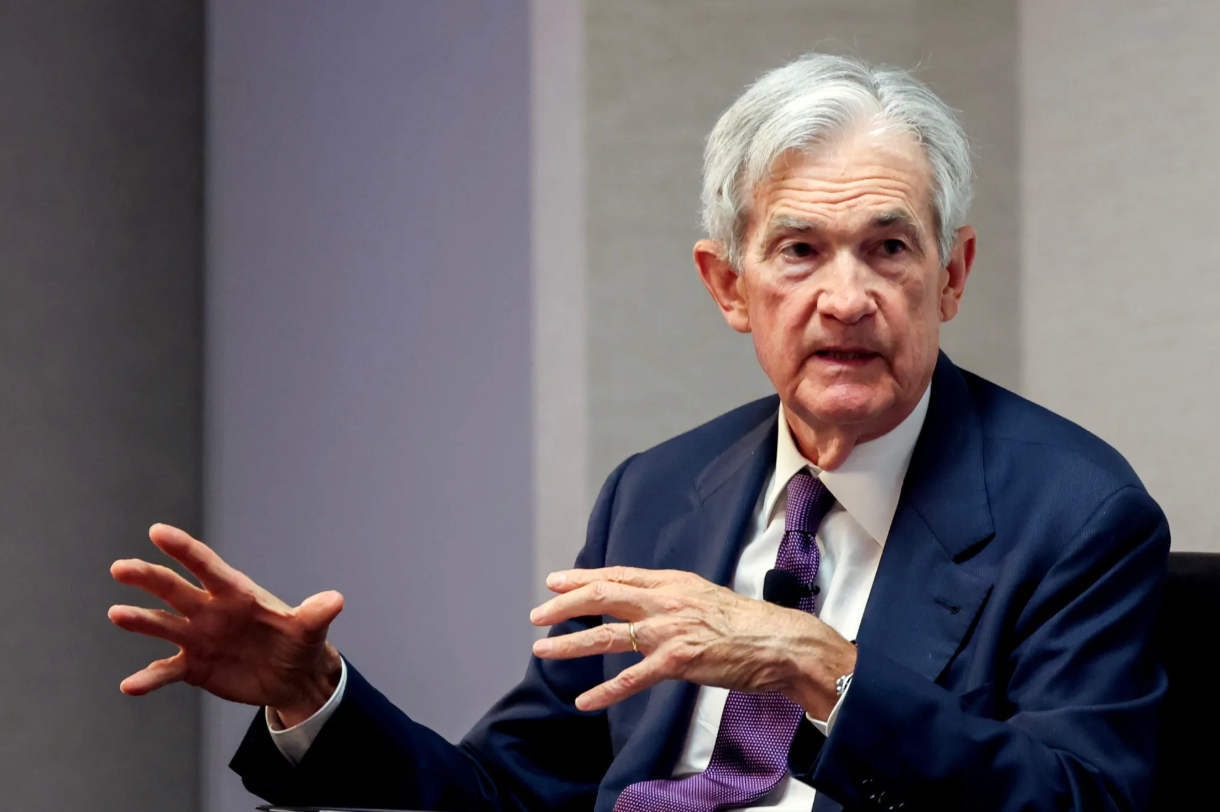Weekly Institutional Insights: Tariffs rattle market as Bitcoin holds better than TradFi
Apr 7, 2025: Our weekly Institutional Insights explores the latest market developments — market performance, industry news, exchange-traded fund (ETF) flows, trending topics, upcoming events and token unlocks — to help you supercharge your crypto trading.
Enjoy our weekly take on the market!
Weekly highlight — Fed not ready to adjust rates
Federal Reserve Chair Jerome Powell emphasized that the central bank will not rush to respond to the Trump administration's tariffs or the resulting market turmoil stemming from fears of a global economic downturn. At a conference in Virginia, he acknowledged that tariffs could significantly impact the US economy, leading to slower growth and higher inflation. However, he stated that the Fed will wait for more clarity before considering interest rate cuts.
With inflation still elevated, Powell stressed the Fed's responsibility to prevent a temporary price surge from evolving into a persistent inflation issue. Julia Coronado, President and Founder of MacroPolicy Perspectives, noted that due to current inflation levels, the Fed is not as well positioned to offer economic support as during previous trade disputes.. Even if rate cuts become necessary, they’re likely to be delayed and cautious.
Following Trump’s announcement of new tariffs, stocks fell sharply, with the S&P 500 facing its worst week since the COVID-19 lockdowns. Economists have raised concerns that these tariffs could lead to a recession, prompting increased speculation about the timing of potential rate cuts. Powell's recent comments marked a shift from his earlier stance that inflation effects from tariffs would be short-lived.
He reiterated the Fed's commitment to maintaining stable long-term inflation expectations and acknowledged the uncertainty surrounding the tariffs' economic impact. Despite signs of deteriorating consumer sentiment and business spending, Powell argued that definitive data has yet to emerge.
As the Fed prepares for its next meeting, futures markets have adjusted expectations regarding rate cuts. Powell's remarks suggest that a preemptive rate cut is unlikely before assessing the broader economic implications of the recent tariffs.
Weekly crypto highlight — Bitcoin’s resilience amid tariffs’ induced volatility
On Apr 2, 2025, Donald Trump announced aggressive U.S. tariffs: a universal 10% on all imports, with specific rates of 34% on China, 24% on Japan and 20% on the European Union (EU), while notably exempting Russia. This policy shift triggered significant volatility in both traditional and cryptocurrency markets. The announcement’s timing, just after US stock markets closed, appeared strategically timed to limit immediate reaction.
The next day, the S&P 500 fell over 5.1% and the Nasdaq Composite dropped more than 5.6%, reflecting investor fears of economic disruption and rising inflation. This was the fifth-worst trading day of the 2020s, reminiscent of Black Thursday in March 2020. In contrast, Bitcoin showed resilience, trading at around $81.7K, only a 6% decline from its recent low, indicating that investors may see cryptocurrencies as hedges against geopolitical uncertainties.
Trump framed the tariffs as the start of a "Liberation Day," introducing a two-tier system: the universal tariff effective April 5, with reciprocal tariffs on about 60 countries starting April 9. This approach aims to counteract existing tariffs on U.S. goods, compelling nations and regions like China, Japan and the EU to reconsider their trade policies.
Extreme measures and potential backlash
Asian countries face severe impacts, with tariffs as high as 49% on Cambodia and 48% on Laos. Supporters view these tariffs as negotiation tactics, challenging nations to accept favorable trade terms or incur higher export costs. Trump argues this will lead to fairer trade conditions, while critics warn of potential retaliatory tariffs, increased costs for American consumers and broader economic uncertainty.
The success of this policy depends upon whether nations opt for cooperation over confrontation. Proponents believe nations will negotiate to avoid losing access to the lucrative US market, potentially boosting US jobs and profits.
Bitcoin’s Resilience
Amid this turmoil, Bitcoin has shown surprising stability, holding at around $80K despite traditional market volatility. Its drawdown was significantly less severe than that of major stock indices, suggesting it may be viewed as a safe haven during economic uncertainty.
Factors contributing to Bitcoin’s resilience include its decentralized nature, which insulates it from traditional market shocks, and growing acceptance as a legitimate asset class. Continued institutional interest, driven by entities such as Strategy and BlackRock, reinforces its appeal.
In conclusion, Bitcoin's strength amid tariff-induced volatility underscores its potential as a digital asset, and signals a growing acceptance among investors seeking stability in uncertain economic times. This could signify a pivotal shift within the world’s financial landscape toward viewing cryptocurrency as a mainstream financial instrument.
Other top-performing tokens
Token | Catalyst |
LayerZero (ZRO) | ZRO was up 6.9%, as BounceBit enables BBTC and BBUSD token bridging across Ethereum and BNB Chain via LayerZero. Read more here. |
Compound (COMP) | COMP was up 14.3%, following the proposal for the creation of a foundation to ensure consistent leadership and coordination by Compound. Read more here. |
Vaulta (EOS) | EOS was up 4.1%, as Vaulta bridges CeFi and DeFi for secure wealth management, payments and investments. Read more here. |
